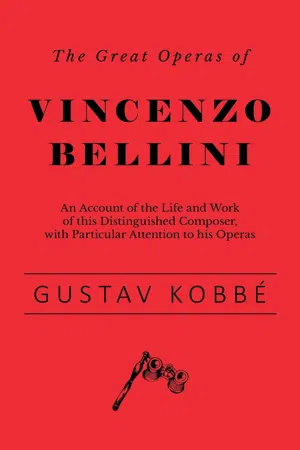
The Great Operas of Vincenzo Bellini - An Account of the Life and Work of this Distinguished Composer, with Particular Attention to his Operas
- 26 pages
- English
- ePUB (mobile friendly)
- Available on iOS & Android
The Great Operas of Vincenzo Bellini - An Account of the Life and Work of this Distinguished Composer, with Particular Attention to his Operas
About This Book
"The Great Operas of Vincenzo Bellini" is a detailed account of the life and work of Vincenzo Bellini by Gustav Kobbé, with a particular focus on his operatic compositions. Vincenzo Bellini (1801 – 1835) was an famous Italian opera composer. Notable operas by this composer include: "Adelson e Salvini" (1825), "Bianca e Gernando" (1826), and "II Pirata" (1827). This vintage volume is highly recommended for opera lovers and is not to be missed by those with an interest in the life and work of one of it's greatest figures. Gustav Kobbé (1857 – 1918) was an American author and music critic famous for his guide to the operas, "The Complete Opera Book", (1919). Other notable works by this author include: "The Ring of the Nibelung" (1887), "Wagner's Life and Works" (1890), and "New York and its Environs" (1891). Many vintage books such as this are becoming increasingly scarce and expensive. We are republishing this book now in an affordable, modern, high-quality edition complete with a specially-commissioned new introduction on the history of the theatre.
Frequently asked questions
Information
COUNT RODOLPHO, Lord of the castle | Bass |
TERESA, proprietress of the mill | Soprano |
AMINA, her foster daughter | Soprano |
LISA, proprietress of the village inn | Soprano |
ELVINO, a young farmer | Tenor |
ALESSIO, a villager | Bass |
Time—Early Nineteenth Century. | Place—A Village in Switzerland. |


Table of contents
- Cover
- Title
- Copyright
- A History of The Theatre
- Content
- Vincenzo Bellini: (1802–1835)